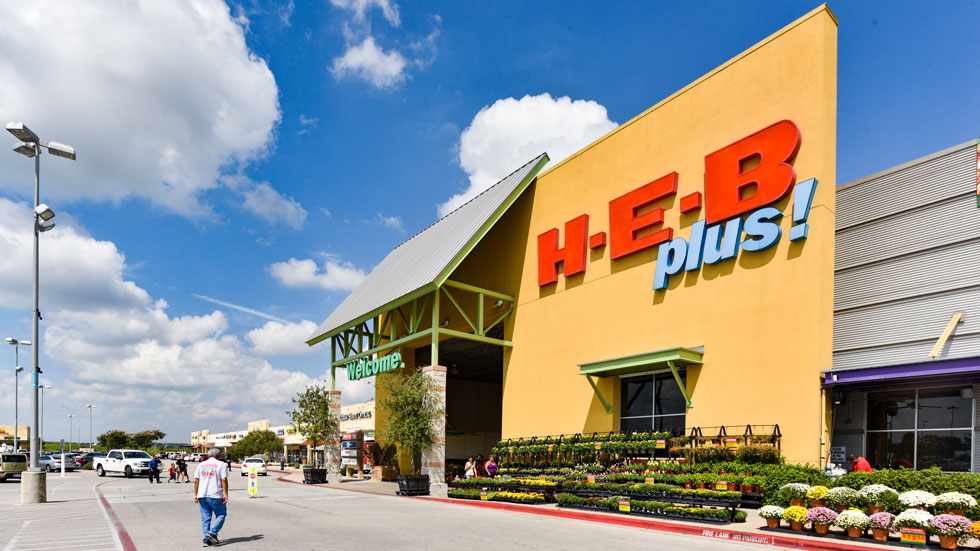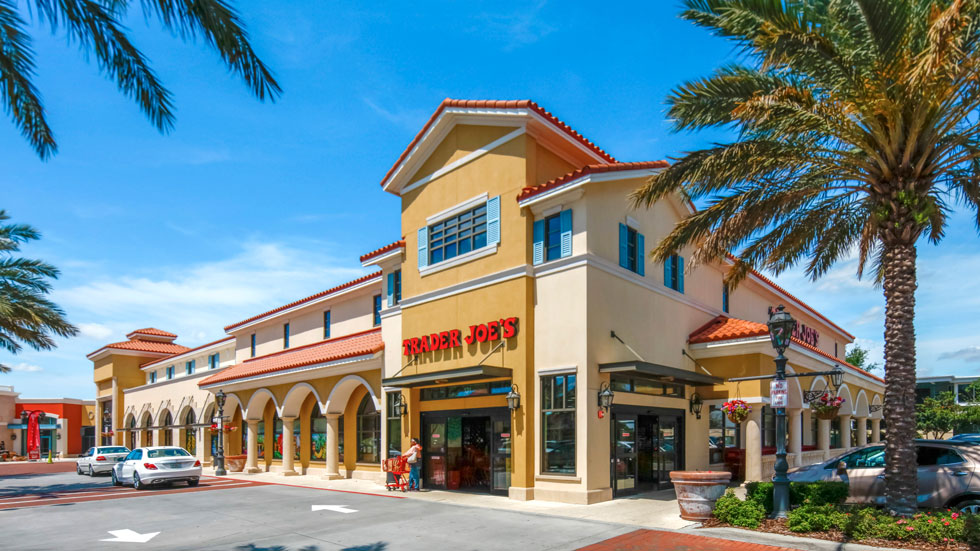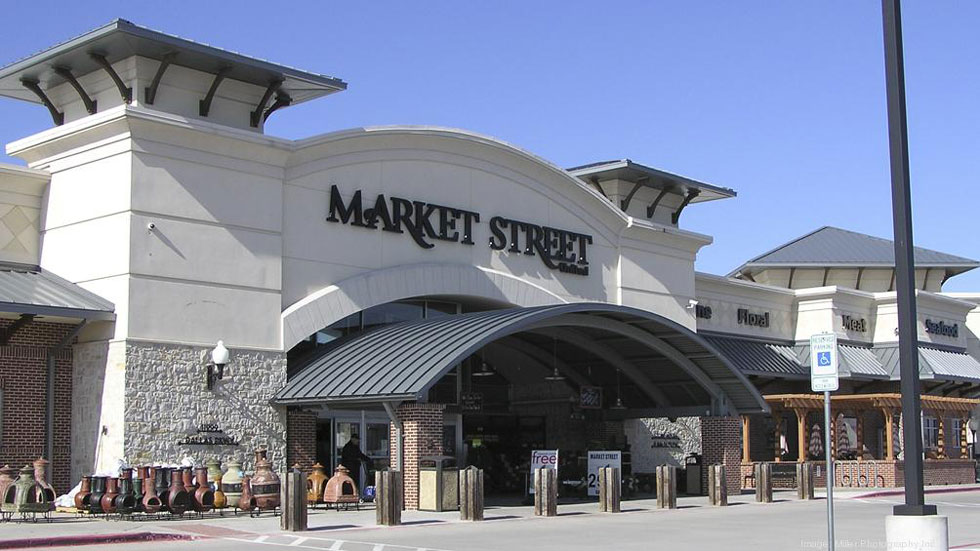When InvenTrust Properties Corp. (NYSE: IVT) decided to go public late last year, joining the competitive shopping center REIT sector, it distinguished itself by bringing to market a concentrated portfolio of grocery-anchored, open-air centers in key growing Sun Belt markets with favorable demographics.
“It’s not lost on us that there’s a lot of options in the public real estate market as it relates to open-air shopping centers,” says Daniel (DJ) Busch, president and CEO of the Downers Grove, Illinois-based company. “We looked at what we could do to provide a differentiated investment, and that differentiator was our concentration in the Sun Belt.” He notes that over 90% of InvenTrust’s income comes from the Sun Belt, and says no other REIT has the same level of concentration in these markets.
The company started more than 15 years ago, originating as a non-traded diversified REIT known as Inland American Real Estate Trust, Inc., with approximately $13 billion in assets spread out among hotels, office, student housing, industrial, multifamily, and more. It was in 2016 when InvenTrust started to mirror more of what it is today—a pure-play retail REIT with a Sun Belt grocery-anchored portfolio.
Busch joined the company in 2019 and took over the top spot in August 2021—two months before InvenTrust’s listing on the New York Stock Exchange. Prior to joining InvenTrust, Busch had been a managing director at Green Street and had followed the company’s story for quite some time.
“Spending most of my career in the retail real estate sector, the focused-nature of the portfolio and where they were trying to go really resonated with me,” he says. “It had become a unique market story with mostly necessity-based, grocery-anchored assets with the hopes of providing liquidity for its shareholders, and I joined as CFO to help provide that liquidity.”
Starting Date
The pandemic sidetracked the company’s plan a bit, but it also provided a silver lining in terms of the resiliency that it found in its own portfolio, navigating through the pandemic, working with tenants, and realizing the strength of its assets.
“This gave us further conviction that when the time was right, we were going to be able to pursue that liquidity event for shareholders because there was real embedded value in the portfolio,” Busch says.
The liquidity plan had to focus on efficiency and speed, while also preserving upside for additional shareholders.
“The market had recovered so quickly—both the economy itself and consumer spending—but also the retail REIT sector rebounded in a very surprising form,” Busch says. “We were ready, and we moved quickly.”
Busch describes the listing as “really the starting gate” for InvenTrust. “We have a lot of opportunity and runway ahead of us. The goal is to keep it very simple. We feel institutional investors appreciate simple stories with focused initiatives and strategies. And that’s what we’re trying to provide.”
Sizing Up the Belt
In 2019, Busch found himselfin the fortunate position that when he joined the company, InvenTrust was already 80% concentrated in the Sun Belt.
“The fundamental trends in the Sun Belt had already started, but really accelerated with the pandemic,” Busch says. “It was a structural shift in relation to the migration we are seeing in our markets.” InvenTrust is now in about 15 markets, concentrated and clustered in the locations it sees as strongest.
“That strategy should continue to bear fruit as we continue to see the demographic shifts to the Sun Belt. With the business-friendly environments, high paying jobs, and the amount of new household formations, we believe this is all good for future discretionary and essential retail spending,” Busch says.
There are several key components InvenTrust considers before acquiring any property, with one being whether the asset is something the team is comfortable operating, and can it be successfully managed by one of the company’s regional offices. Another goal of InvenTrust is to cluster assets within two hours of their regional operations teams.
“It also has to have the merchandise mix that we’re comfortable with, which tend to have a grocer,” Busch says. “But if a grocer is not an anchor, it should have a necessity-based or service-based, non-discretionary-based, merchandise mix that is synergistic to our operating platform. New acquisitions must be able to drive accretive cash flow to the overall portfolio.”
Busch notes that economic and retail challenges are cyclical in nature, and they’re always going to be there, but the properties lend themselves nicely for InvenTrust to find creative ways to solve any issues.
“Retail is a tough business; some of the top retailers today won’t be the top retailers 10 years from now,” he says. “The challenge for landlords is how do we continue to help invest with the retailers that are being proactive in evolving their business models appropriately, and how do we curate our merchandise mix when we have the opportunity to bring in the new and exciting retailers for the future.”
Middle of the Bull's Eye
In February, InvenTrust added two prominent, grocery-anchored shopping centers located in Austin, Texas to its portfolio, acquiring the 357,000-square-foot Shops at Arbor Trails (anchored by Costco and Whole Foods) and 168,000-square-foot Escarpment Village (anchored by HEB) for a combined $189.3 million.
“It’s very rare when you find assets that check every single box and these two did,” Busch says. “We were already one of the largest REIT owners in the Austin market and now with these assets about 20% of our portfolio’s income is generated from that market. These centers are in the Southwest district, with some of the highest barriers to entry in all the U.S. It’s really in the middle of the bull’s eye.”
Both retail centers have been on InvenTrust’s radar for many years, and after seeing how they performed during the pandemic, it gave the company even more confidence that these were the right properties to go after and bring into the fold.
We have a lot of opportunity and runway ahead of us. The goal is to keep it very simple. We feel institutional investors appreciate simple stories with focused initiatives and strategies.
William Kuo, director of U.S. corporates-real estate & leisure for Fitch Ratings, noted that while InvenTrust has a limited record as a public company, it appears to be a solid operator.
“Management seems committed to its market strategy of acquiring grocery-anchored assets in Sunbelt markets while maintaining a conservative balance sheet,” he says. Fitch believes Sunbelt markets will continue to perform well over the intermediate-to-long term, owing to preferences for affordable living options, increased office work flexibility, and overall demographic trends, he adds.
“Their market and asset exposure we believe are positives, and their relatively smaller size allows them to put more thought in their acquisition strategy to increase their growth profile,” Kuo says.
Forging Ahead
Another area of focus for InvenTrust as it evolves is environmental, social, and governance (ESG), and the company plans to publish its inaugural corporate responsibility report this year.
“ESG is something that InvenTrust has been focused on since 2013,” Busch says. “We’ve worked very closely with our Dutch pension fund joint venture partners and have been a GRESB member since 2018. We would like to think we’re focused appropriately on ESG.”
InvenTrust’s assets in the Sun Belt lend themselves well to environmental initiatives such as smart irrigation, solar power, cool roofs, and EV car charging stations, and it’s something leadership is excited about, not only for the current portfolio but for future acquisitions. InvenTrust is also focused on social initiatives, by providing an engaging and rewarding work environment for their employees and furthering its charitable efforts.
As Busch considers the future of InvenTrust, the impact of the last few years is clearly felt. He points out that for several years leading up to March 2020, the retail real estate market had been experiencing an environment of declining fundamentals and that the pandemic was something of a blessing in disguise for investors.
“The strongest, well-capitalized retailers survived and now are thriving and back in growth mode,” Busch says. “The retailers already in a bit of trouble got washed away. Interestingly, we haven’t seen bankruptcies on a large scale and now we feel like we’re in a period of early real estate cycle fundamentals, which means tenants are looking to grow, occupancy rates are moving higher, and rental rates are accelerating. It’s a good time to be in our business.”
Meanwhile, InvenTrust continues to leverage its balance sheet to find external growth opportunities via new acquisitions, while focusing on leasing up its centers.
“We have experienced good internal growth through both occupancy gains and rental rate increases,” Busch says. “While we’re new as a public company, this is a seasoned team that has been through a tremendous amount of transaction activity. We are in as good a position as we’ve ever been.”


